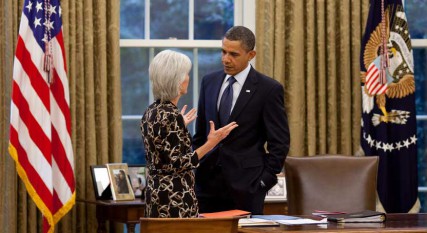The Obama administration is offering to expand the number of faith-based groups that can be exempt from the controversial contraception mandate, and proposing that third-party companies administer coverage for self-insured faith-based groups at no cost.
At its heart, the newest offering from the White House would allow religious groups — dioceses, denominations and others — to decide which affiliated institutions are “religious” and therefore exempt from the new requirement that employers offer free contraception coverage as part of employee insurance plans.
The proposals are an effort by the administration to blunt criticisms of the controversial regulation, especially by the nation’s Catholic bishops, who have been at loggerheads with the White House since President Obama announced the contraception mandate in January.
Obama was sharply criticized by faith groups for not providing a sufficiently broad exemption for religious groups. On Feb. 10 he outlined an “accommodation” that tried to circumvent most of the problems by having insurance companies — rather than religious employers — provide the birth control coverage through a separate rider and at no cost to the employer.
While that move appeased some concerns, Catholic bishops and others argued that the religious exemption was still too narrow and could set a dangerous precedent by appearing to allow the government to determine what groups within a faith should be considered religious.

Others object that many religious groups self-insure in order to save money, and so having the insurer pay for contraception coverage rather than the employer made no difference because insurer and employer are one and the same.
The 32-page proposal, published late Friday (March 16) in the Federal Register, goes out of its way to state that “this religious exemption is intended solely for purposes of the contraceptive coverage requirement” and does not “set a precedent for any other purpose.”
“Whether an employer is designated as ‘religious’ for these purposes is not intended as a judgment about the mission, sincerity, or commitment of the employer, and the use of such designation is limited to defining the class that qualifies for this specific exemption,” states the proposed rule.
The other main innovation in the new proposal is to have a “third-party administrator of the group health plan or some other independent entity” assume responsibility for the contraception coverage for self-insured organizations, with various proposals for ensuring that self-insured groups with religious objections would not directly or indirectly pay for the birth control policy.
Whether any of these ideas will satisfy the die-hard critics of the contraception mandate is unclear, and perhaps unlikely.
“At the end of the day, no accounting gimmick changes the fact that the mandate forces religious organizations to pay health insurance companies for coverage to their employees with drugs and services that simply violates their religious convictions,” said Jeanne Monahan, director of the Center for Human Dignity at the Family Research Council.
Sister Mary Ann Walsh, the spokeswoman for the U.S. bishops’ conference, told National Catholic Reporter she was “surprised that such important information would be announced late Friday of St. Patrick’s Day weekend and as we prepare for the fourth Sunday of Lent.”
Others involved in the negotiations said it would take time to review the proposals properly.
Sister Carol Keehan, the head of the Catholic Health Association, which represents hundreds of Catholic hospitals, said she and her members “will have to give it a careful review” before responding.
Some critics charge that the latest proposals are an effort to “kick the can down the road” so that the administration does not have to issue a final determination until after the November election. Yet the delay in finalizing the regulations could also serve to prolong the debate.
Others believe that the 90-day open comment period on the proposals, known as an “Advance Notice of Proposed Rulemaking,” or ANPR, could actually function as a kind of cooling-off mechanism for this issue, which has exploded into an election-year debate that poses risks and rewards for all sides.
The ANPR at several points sets out a variety of possible solutions to religious objections, and invites “input on these options, particularly how to enable religious organizations to avoid such objectionable cooperation when it comes to the funding of contraceptive coverage, as well as new ideas to inform the next stage of the rulemaking process.”
By providing new details and extending the opportunity for dialogue, the Obama administration can now begin to shift discussions to the nuts and bolts of addressing the religious freedom concerns and away from rhetorical broadsides that the White House is launching a “war on religion” and can’t be trusted.
Staff members from the U.S. Conference of Catholic Bishops were involved in initial discussions to work out a deal, but those ground to a halt when bishops accused the White House of negotiating in bad faith, a charge the administration strongly rejects.









